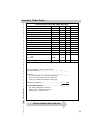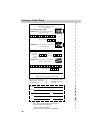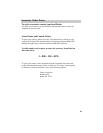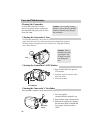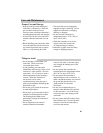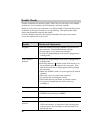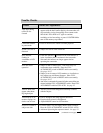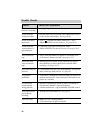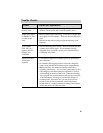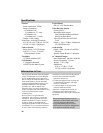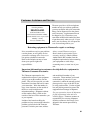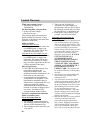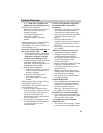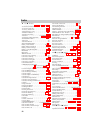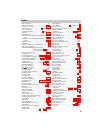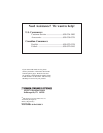
88
Specifications
General
Power requirement: 6VDC
Power consumption:
LCD Monitor off,
Viewfinder on: 5.7 watts
LCD Monitor on,
Viewfinder off: 7.5 watts
Weight: 2.3 lbs. (1,000g)
Dimensions – Including Viewfinder
4-15/16"(W) x 4-1/2"(H) x 9-1/16"(D)
124 (W) x 113(H) x 230(D) mm
Camera Section
Image Sensor: 1/4" CCD Imager
Lens: F1.2, (f = 4.1-57.4 mm)
Filter Diameter: 46 mm
Viewfinder
1/2" Black and White CRT
LCD Monitor
3" Diagonally Measured
LCD/TFT Active Matrix System
Tripod Mount
One 1/4" x 20 Threaded Hole
Video Recorder Section
Format: VHS-C
Record/Playback System:
Four VideoRecord/Playback Heads
One Flying Erase Head
Video Signal: EIA Standard NTSC
Color
Output: 1 Vp-p, 75 Ohms, Unbalanced
(via VIDEO Out Jack)
Audio Section
Output: -8dBs, 1 k-ohm (via AUDIO
Out Jack)
Speaker: 20mm Round x 1, Monaural
AC Adapter/Charger
Power requirement: 100-240 V, 50/60 Hz.
Power consumption: 23 watts
Weight: .7 lbs. (320g)
Dimensions:
6"(W) x 1.7"(H) x 2.7"(D)
150 (W) x 42(H) x 68(D) mm
Information to User
This Class B digital apparatus meets all
requirements of the Canadian Interference
— Causing Equipment Regulations.
Cet appareil numérique de la classe B
respecte toutes les exigences du Réglement
sur le matériel brouilleur du Canada.
This equipment has been tested and found to
comply with the limits for a Class B digital
device and RF lighting device pursuant to
Part 15 and part 18 of the FCC Rules. These
limits are designed to provide reasonable
protection against harmful interference in a
residential installation. This equipment
generates, uses, and can radiate radio
frequency energy and, if not installed and
used in accordance with the instructions, may
cause harmful interference to radio
communications.
However, there is no guarantee that
interference will not occur in a particular
installation. If this equipment does cause
harmful interference to radio or television
reception, which can be determined by
turning the equipment off and on, the user is
encouraged to try to correct the interference
by one or more of the following measures:
• Reorient or relocate the receiving antenna.
• Increase the separation between the
equipment and receiver.
• Connect the equipment into an outlet on a
circuit different from that to which the
receiver is connected.
• Consult the dealer or an experienced
radio/TV technician for help.
Alterations or modifications carried out
without appropriate authorization may
invalidate the user’s FCC right to operate the
equipment.



